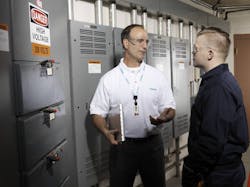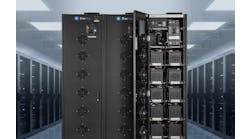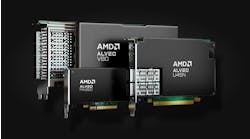A New Era for Electrical Safety in Data Centers: Understanding and Implementing NFPA 70B, the Standard for Electrical Equipment Maintenance
Data centers are the backbone of today’s digital economy, and maintaining continuous operation remains a strategic imperative. And yet, electrical system failures can disrupt data center operations, causing not just unplanned downtime but also long-term damage to the reputation and financial stability of the businesses that rely on this critical infrastructure.
Not surprising, then, is the role of the National Fire Protection Association (NFPA) in making electrical equipment maintenance a standard to reduce risks to people and property. NFPA 70B has been elevated to a standard as part of the changes released in 2023 – a significant transition from its longstanding status as a set of recommended practices.
The change includes the option for continuous electrical system monitoring and predictive maintenance, with the benefit of extended time intervals between equipment maintenance. The result: less frequent electrical system shutdowns for maintenance. Compliance with NFPA 70B may also lead to lower insurance premiums due to the associated reduced risk.
In this article, we review the NFPA 70B standard; explain its purpose and intention; and explore how proactively complying with it, even before your state or local AHJ mandates compliance, can benefit your data center, from both an operational standpoint and – more importantly – an employee safety perspective.
NFPA 70B purpose and tradition
NFPA began as a local organization for fire sprinkler codes and today embodies more than 300 codes and standards to protect people’s lives and livelihoods. Originally a set of recommended practices published about 50 years ago, NFPA 70B emphasizes a comprehensive approach to preventive maintenance of electrical equipment as a cornerstone of electrical system safety.
NFPA 70B requires regular, detailed inspections and testing of electrical systems to identify and mitigate potential hazards before they lead to failure. Moreover, this standard may reduce the likelihood of unexpected failures, translating into improved uptime and availability so that data center operations run smoothly.
Further, the standard underscores the importance of engaging qualified personnel for maintenance tasks, ensuring those handling electrical systems are well-versed in safety standards and best practices.
NFPA 70B also advocates for a documented maintenance program, which includes a schedule of routine maintenance activities, procedures for corrective maintenance, and record-keeping of all personnel training and maintenance activities. This proactive approach not only empowers organizations as they work toward compliance with safety regulations but also enhances system reliability, reduces the risk of unexpected downtime, and prioritizes employee safety.
Complementing NFPA 70B are the National Electrical Code (NEC) and NFPA 70E, the Standard for Electrical Safety in the Workplace, which create a comprehensive framework for the safe installation and maintenance of electrical distribution. Together, these standards form a robust safety net, protecting both the physical infrastructure and the people who interact with these systems.
Today, NFPA 70B has evolved into a standard that mandates preventive maintenance for electrical systems to enhance workplace safety and protect people from electrical hazards. The 2023 edition of NFPA 70B, Standard for Electrical Equipment Maintenance, became effective on January 16, 2023, when it was approved as an American National Standard by the American National Standards Institute (ANSI).
Relevance to data centers
This transition is more than a regulatory update; it’s a call to action. NFPA 70B’s new status necessitates a proactive approach to electrical system maintenance, focusing on personnel safety, system reliability, and continuous improvement planning.
Adhering to NFPA 70B can benefit data centers in ways that extend beyond mere compliance. In short, preventive maintenance is a widely recognized practice for increasing the reliability and lifespan of various systems and equipment – including electrical systems. Examples of high-profile electrical system failures abound. From the delay in Super Bowl XLVII, caused by improper switchgear protective device settings, to an electrical system outage at the Atlanta airport that led to the cancellation of more than 1,500 flights—the value of preventive maintenance for system reliability cannot be overstated.
Because NFPA 70B now includes the option for continuous electrical system monitoring, data centers can take advantage of real-time tracking of equipment performance, utilizing sensors and advanced analytics to detect anomalies before they devolve into significant issues. This updated, predictive approach allows data center operators to better understand system health, anticipate and proactively address potential future failures, identify trends, and—ultimately—avoid the costly consequences of both unplanned and planned downtime.
Relying on temperature sensors, rather than IR thermography scanning, is also safer for data center employees. IR thermography requires a skilled technician wearing proper PPE with a scanning device to open electrical equipment to gain temperature readings at the points where voltage and currents pass through. However, with temperature sensors installed on electrical equipment, data centers receive continuous temperature readings (far exceeding NFPA 70B requirements) without exposing workers to live voltage.
Moreover, a predictive maintenance strategy that leverages data analytics can help extend equipment lifecycles while enabling maintenance activities to be conducted at extended intervals – reducing the frequency of maintenance in ways that support business continuity and uptime.
Consequences of ignoring preventive maintenance for your electrical systems
Electrical system failures can result in significant downtime. Consider, for example, the impact of a circuit breaker failure. Whereas these components were readily available as off-the-shelf devices a few years ago, they can now take as much as six months to deliver. This impact is partly because these devices are engineered to suit and partly due to unprecedented demand and tight supply chains. Ultimately, downtime becomes much more significant in terms of product replacement and operational continuity.
Ignoring the NFPA 70B standard can also lead to business gaps, including the increased risk of electrical failures and accidents. These events may create exposure to potential legal liabilities. In the absence of an electrical maintenance program compliant with NFPA 70B, electrical malfunctions could be viewed as negligence, potentially leading to costly litigation and insurance complications.
Looking ahead and getting started
The transition of NFPA 70B from a recommendation to a standard is a significant development in the data center space. It emphasizes the importance of proactive electrical system maintenance for safety, reliability, competitiveness, and legal compliance. To align with NFPA 70B, data centers should begin taking decisive steps:
- Assess the current state of electrical systems, safety training, and electrical maintenance program (EMP) to identify areas needing immediate attention.
- Update maintenance practices, including a preventive maintenance schedule based on NFPA 70B guidelines.
- Engage qualified technicians to help ensure that professionals with expertise in NFPA standards conduct inspections and maintenance.
- Establish a compliant documentation management program.
- Add remote monitoring capabilities and digital services that can provide continuous and predictive monitoring; this addition can increase the time between maintenance cycles, enable early fault detection, reduce lifecycle costs, help improve staff safety and productivity, and reduce unplanned downtime.
As data centers evolve, the focus on continuous improvement and adherence to best practices in electrical system maintenance will become increasingly important. This forward-thinking approach not only safeguards the physical and operational integrity of the data center but also reinforces its role as a pivotal asset in the digital economy.
The commitment to the rigorous maintenance standards within NFPA 70B will help ensure that data centers can meet the ever-growing demands of a connected world while maintaining the highest levels of uptime and customer satisfaction.
NOTE: This article is only a summary of relevant NFPA standards and is not intended to be relied upon as a legal document. This document should not be relied upon to achieve compliance with relevant NFPA standards. Please consult your local AHJ or legal counsel for a full understanding of NFPA standards.

Mike Zapata
Mike Zapata, Head of Data Centers, Americas for Siemens Smart Infrastructure, is responsible for developing and implementing products, solutions, and services to ensure our customers’ data centers are resilient, efficient, safe, and secure. With more than 20 years of industry experience, Mike expertly leads a team at Siemens that brings innovation and advanced technology in building automation, fire and life safety, digitalization, electrification, and decarbonization to create smart data centers.
Siemens Smart Infrastructure is a focused technology company that combines the real and digital worlds across energy systems, buildings and industries, enhancing the way people live and work and significantly improving efficiency and sustainability. Contact Siemens Smart Infrastructure to learn more.

Ed Stadelman
Ed Stadelman, National Sales Manager, Electrical Services for Siemens Smart Infrastructure, is an electrical engineer. He has worked at Siemens for more than 25 years in the Electrical Services group.
Siemens Smart Infrastructure is a focused technology company that combines the real and digital worlds across energy systems, buildings and industries, enhancing the way people live and work and significantly improving efficiency and sustainability. Contact Siemens Smart Infrastructure to learn more.





